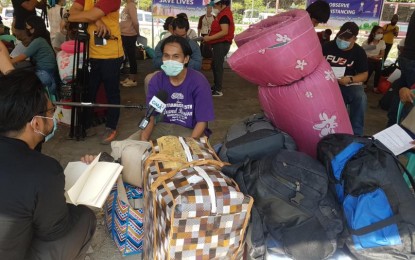News
Solon bats for nat’l policy on Balik Probinsya program

FILE: Beneficiaries of the Balik Probinsya program are interviewed by the media on Wednesday (May 20, 2020). The first batch of the program left for Leyte on Wednesday afternoon. (Photo via Marita Moaje via PNA)
MANILA – A party-list lawmaker on Thursday called for the swift passage of a measure instituting a Balik Probinsya Program to promote regional development and resilient communities during crisis situations.
AAMBIS-OWA Rep. Sharon Garin, chair of the House Committee on Economic Affairs, said House Bill 7111 seeks to decongest highly urbanized areas, promote regional socioeconomic development, and establish mechanisms for sustainable reintegration.
Garin said the coronavirus disease (Covid-19) pandemic has exposed population congestion in certain localities that enhanced the vulnerability of poor families, women, children, older persons, and adolescents to emerging pandemics or epidemics.
“The goal of the bill is to reduce this vulnerability by attaining equitable voluntary spatial distribution of the population and strengthen the resiliency of families and communities. We need to encourage the urban population to return and be reintegrated in their areas of origin within the context of informed choice and voluntarism,” she said.
Citing the 2018 Report of the Philippine Statistics Authority (PSA), Garin said three highly urbanized regions — National Capital Region (NCR), Calabarzon (Region 4-A), and Central Luzon (Region 3) –accounted for about two-thirds, or 62 percent of the total gross domestic product (GDP) of the entire country while the remaining one-third was shared by the rest of the 14 regions.
“This condition reflects a highly unequal and inequitable socioeconomic development across regions in the country,” she added.
The bill proposes the provision of subsidies for livelihood, support to employment, and income-generating activities for beneficiaries. This shall be fulfilled in coordination with local government units (LGUs) and private business institutions within the relocation area.
To encourage private entities to relocate their investments in the countryside and suburban areas, participating institutions may enjoy incentives such as, but not limited to, tax rationalization, financial subsidies, and other administrative support for viable businesses, economic enterprises, and investments.
The bill also requires the formulation of a national and regional Balik Probinsya inter-agency and multisectoral medium-term plan, which shall serve as a guide for the various component strategies of the program.
The plan shall be integrated as part of the Regional and Provincial Development Plans and approved by the concerned Provincial Governor and Sanggunian Panlalawigan.
Garin expressed hope that the bill will be fast-tracked to address the needs of the time.
On May 6, 2020, President Rodrigo Duterte signed Executive Order No.
114 institutionalizing the “Balik Probinsya, Balik Pag-asa” (BP2) program.
Nearly 90,000 individuals have availed of the BP2 before it was suspended on June 11 to give way to the return of repatriated overseas Filipino workers (OFWs), overseas Filipinos, tourists, and locally stranded individuals (LSIs) under the separate government program “Hatid Tulong” amid the Covid-19 pandemic.
The BP2 program, a pet project of Duterte’s former aide and now Senator Christopher “Bong” Go, seeks to decongest Metro Manila, which is home to 12.87 million Filipinos.
It aims to boost countryside development and inclusive growth, provide adequate social services, promote full employment, industrialization, and improved quality of life in rural areas, and prepare the country for the “new normal” after the Covid-19 pandemic and other future health crises.





















